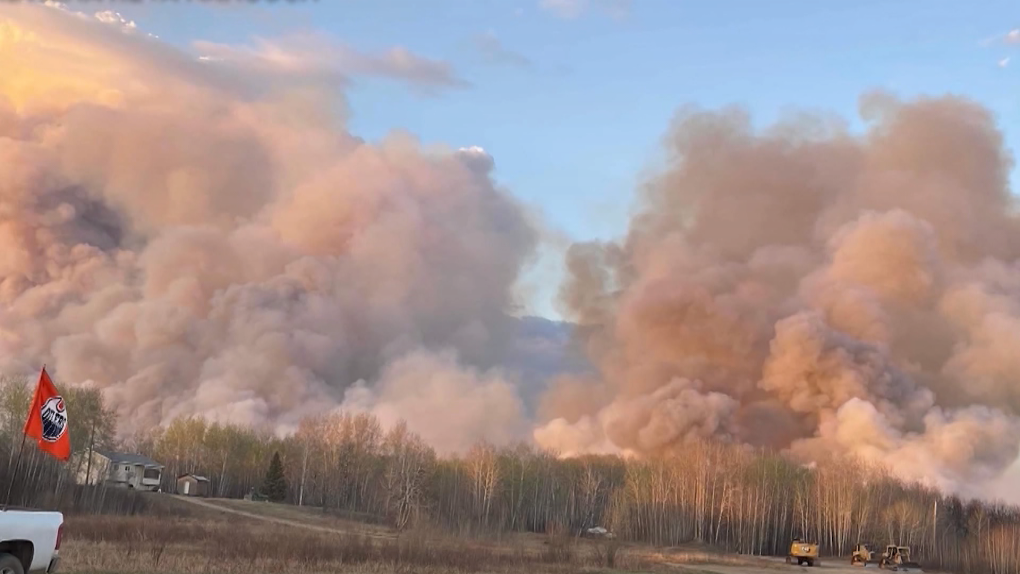Global Courant 2023-05-31 04:06:00
While her fellow community members return to their homes in the East Prairie Métis Settlement, Tamara Payou is left waiting at a hotel in High Prairie, Alta.
Earlier this month, a wildfire ripped through her native communityburning down buildings, a bridge, destroying trees and leaving a trail of ash.
The house where Payou’s family previously lived, along with a brand new caravan they moved into in January – both of which were uninsured – burned down. And since the fire broke out, three of their five dogs have gone missing.
Payou is also concerned about her brother, who was one of the firefighters battling hot spots in the community. She said that one day he was cutting down a tree when it suddenly fell on him, knocking him out and seriously injuring him. His house also burned down.
Now, Payou says she takes things “day by day.”
She awaits word from councilors and other community officials when she, her husband Cory Bellerose and their 14-year-old son, along with her brother and his family, can move back to their community. An evacuation order there was downgraded from an order to a warning last Wednesday.
“Everyone else has to go home because the power and everything is plugged in,” Payou told CTVNews.ca in a phone interview.
“We didn’t go home because we don’t have a home to go to.”
The East Prairie Métis Settlement is one of several Indigenous communities hard hit by the recent wildfires in Alberta. As the wildfire season continues, residents and community officials peer among the ruins, pondering how they will recover from all the losses.
“We estimate a little over $7 million to rebuild my community with everything we need to do — just (for) the infrastructure on the bridge itself and housing,” Raymond Supernault, president of the East Prairie Métis Settlement, told CTVNews. ca in a telephone interview.
“It’s bizarre how much damage there was and how much it will cost to replace each house.”
‘WE ARE GOING TO RENOVATE’
Located about 100 miles east of Grande Prairie, Alta., the East Prairie Métis Settlement has a population of about 300 people. The fire destroyed at least 14 inhabited homes in the community, as well as sheds, sheds and numerous vehicles, Supernault said.
Some homes had been owned by residents for decades and housed their most cherished mementos, he added.
“The fire took everything in its path,” said Supernault.
“A lot of people are in shock right now, just to go back and see our community. They look at the houses that have burned down and that are no longer there. These are our neighbours, our friends, our relatives who have lost many homes.”
The focus of the East Prairie Métis Settlement is now on rebuilding — a process that Supernault says will take at least a year. The community plans to do it all itself if it has to, he said.
“We are going to rebuild… and do what we have to do because right now we are just waiting. We’re always waiting for people to say, ‘Hey, we can help you with this,'” Supernault said.
About 110 miles east of High Level, Alta., Fox Lake, one of three Woodland Cree communities that make up the Little Red River Cree Nation, is experiencing a similar heartbreak.
As of Tuesday, an evacuation order remained in effect for Fox Lake as a fire — estimated to cover more than 85,000 acres — continued to spiral out of control in the community. To date, the community has lost more than 300 buildings, including at least 110 homes, to the fire.
Darryel Sowan, an emergency management communications coordinator for the Little Red River Cree Nation, said the 3,000-member community is currently scattered between an arena complex in High Level, a recreation center in Fort Vermilion, Alta., the High Level Native Friendship Center, and a few hotels.
Sowan said Little Red River Cree Nation officials are setting up camps where they hope to move residents while they wait for the fire to die down.
The eastern side of the Paskwa Fire (HWF030) burns in Alberta’s High Level Forest Area district in a May 9, 2023 handout photo. THE CANADIAN PRESS/HO-Government of Alberta Fire Service, *MANDATORY CREDIT* HO
“We’re doing our very best to get them off those cots and mats on the gym floor and into real beds,” he told CTVNews.ca in a phone interview.
Sowan said the cost of rebuilding the Fox Lake community, which has no year-round road access, will be “significant.” He noted the the housing situation in Fox Lake was already “serious” before the fire destroyed dozens of homeswith 20 people in some buildings.
“Fox Lake is only accessible by barge. It will be heavily renovated this summer, because how do we get houses across the street? The ship can only hold so much weight that we couldn’t possibly put a house on a ship and move it across,” he said.
“The chief said… he doesn’t want to rebuild Fox Lake the way it was – he wants to build Fox Lake the way it should be. That’s what we’re going to try.”
The Little Red River Cree Nation is also paying close attention to the situation in Garden River, Sowan said.
“This situation is tense as Garden River is currently on a 24-hour evacuation notice due to its proximity to the (Paskwa fire),” he explained, adding that the fire is less than seven kilometers from that community.
In a 2022 report, Health Canada documents how First Nations, Inuit and Métis peoples in Canada are “particularly sensitive” to the impacts of climate change because they tend to live in geographic regions with extreme weather and have a close relationship and dependence on the environment. This, the report notes, could exacerbate existing health and socioeconomic inequalities in their communities.
GOVERNMENTS RESPOND TO FIRE
In an emailed statement, the Office of the Minister of Indigenous Services said the federal government is working to support Indigenous communities affected by the wildfires.
“Across the country, First Nation, Inuit and Métis communities are on the front lines of the impacts of wildfires. Climate change means extreme weather events have become more frequent, severe and destructive,” the statement read.
“This is why our government is investing (in) meaningful climate action – and working with Indigenous communities to get the support they need, including helping First Nations communities through the Emergency Management Assistance Program (EMAP).”
Thick smoke from the Fox Lake fire can be seen from the ship landing on Little Red River Cree Nation in northern Alberta. (Source: Jarvis Nanooch)
EMAP helps communities access emergency services for indigenous lands. It also provides funding to provinces, territories and non-governmental organizations to support emergency management in the reserve.
On Monday, the Alberta government said it had more than 2,800 personnel working to respond to wildfires in the province, including support from partner agencies in Canada, the United States, Australia and New Zealand, as well as the Canadian Forces.
Among other things supports the province also provides one-time emergency financial assistance to those evacuated due to wildfires and has processed more than 16,400 applications to date.
COMMUNITIES MEET
Meanwhile, Supernault gave credit to Indigenous firefighters from its community and surrounding communities, who work day in and day out to prevent further destruction.
“These guys are trained, they’ve been doing it all their lives,” he said.
He said one positive thing that has come out of the fires is community members have united.
“They came together and helped each other and it was really good to see,” Supernault said.
“This is how a church should be, right? Togetherness and helping each other.”
Multiple crowdfunding pages have been set up to help the people of the East Prairie Métis Settlement, Fox Lake and other wildfire affected communities.








